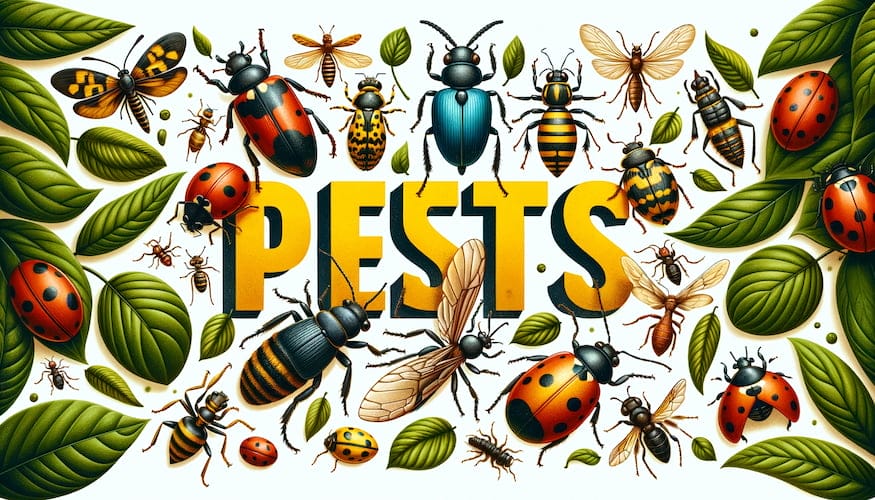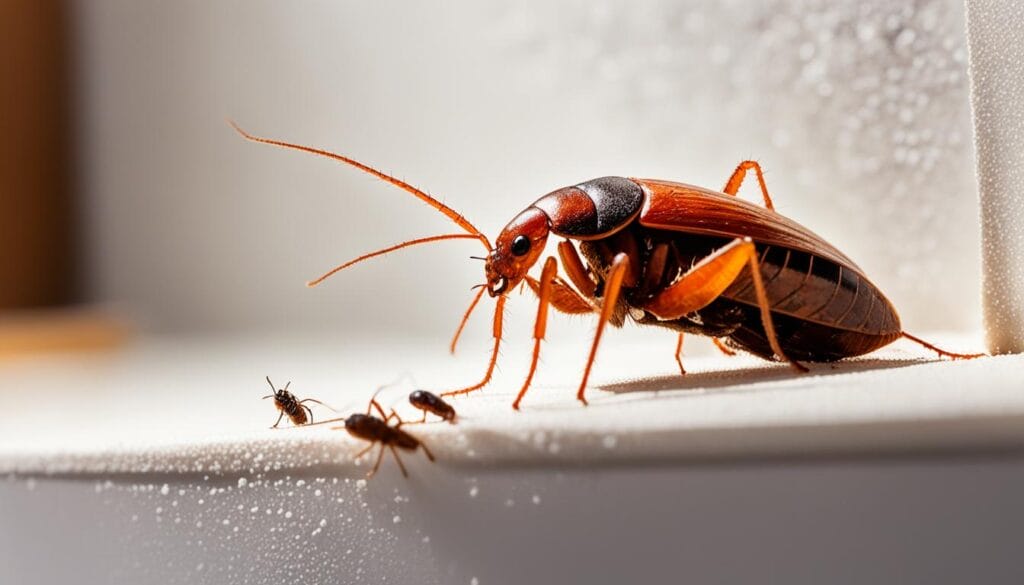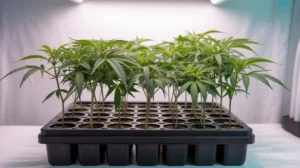Dealing With Common Pests: Effective Tips

Did you know that pests cause billions of dollars in property damage each year? From termites chewing through wooden structures to rodents contaminating food supplies, common pests can wreak havoc on our homes and gardens. Fortunately, there are effective tips and strategies to deal with these nuisances and keep them at bay.
In this article, we will explore the world of common pests and provide you with valuable insights on how to handle them effectively. Whether you’re dealing with ants in your kitchen, mosquitoes in your backyard, or spiders lurking in dark corners, we’ve got you covered with practical pest control tips and proven pest management strategies.
Key Takeaways:
- Common pests can cause significant property damage.
- Effective tips and strategies can help you deal with pests.
- Stay informed and proactive to keep your home and garden pest-free.
- We will provide practical pest control tips and proven pest management strategies.
- Learn how to identify pests, prevent infestations, and deal with them naturally.
Identifying Common Pests
Before you can effectively deal with pests, it is crucial to be able to identify them. In this section, we will explore common pests that may invade your home or garden and how to identify them.
1. Ants
Ants are tiny insects that can be found both indoors and outdoors. They are typically attracted to food sources and can enter your home through small cracks and openings. Common types of ants include:
- Black ants
- Carpenter ants
- Fire ants
- Pharaoh ants
To identify ants, look for their distinctive body shape with three distinct segments: head, thorax, and abdomen. Additionally, ants have elbowed antennae and a constricted waist.
2. Cockroaches
Cockroaches are resilient pests that can pose a threat to your home and health. They are commonly found in warm and moist areas. Some common species of cockroaches include:
- American cockroach
- German cockroach
- Oriental cockroach
Cockroaches have flat, oval-shaped bodies and long antennae. They are typically brown or black in color and can range in size from small to large, depending on the species.
3. Termites
Termites are destructive pests that can cause significant damage to wooden structures. They are commonly found in moist and humid environments. Termites can be identified by their soft bodies, straight antennae, and wings of equal length.
4. Mosquitoes
Mosquitoes are flying insects known for their itchy bites. They are common in areas with standing water. Mosquitoes have slender bodies, long legs, and narrow wings. Female mosquitoes are known for their long mouthparts used for sucking blood.
5. Rodents
Rodents such as rats and mice can cause damage to your home and spread diseases. They are attracted to food sources and can gain access through small openings. To identify rodents, look for their characteristic long tails, small ears, and sharp front teeth.
“Identifying common pests is the first step towards effective pest control. By knowing what pests you are dealing with, you can implement targeted remedies and DIY solutions to keep your home and garden pest-free.”
Pest Prevention Techniques
When it comes to dealing with pests, prevention is always better than cure. By implementing effective pest prevention techniques, you can safeguard your home and garden from common pests. Here are a few tried and tested methods to keep pests at bay:
1. Seal Entry Points
One of the most important steps in pest prevention is sealing off potential entry points. Inspect your home for any cracks, gaps, or openings that pests can use to gain access. Seal these entry points using caulk, weatherstripping, or mesh screens to create a barrier against pests.
2. Maintain Cleanliness
Pests are attracted to clutter and food sources. Regularly clean your home and garden, paying attention to areas such as kitchens, pantries, and outdoor spaces. Dispose of garbage properly, store food in airtight containers, and clean up spills and crumbs promptly.
3. Remove Standing Water
Standing water can attract pests like mosquitoes and flies. Eliminate any sources of standing water, such as flower pots, bird baths, or clogged gutters. Ensure proper drainage to prevent water from accumulating and becoming a breeding ground for pests.
4. Proper Waste Management
Dispose of trash and waste properly to prevent pests from being attracted to your property. Use secure garbage bins with tight-fitting lids, and regularly remove garbage to avoid odors and infestations.
5. Trim Vegetation
Overgrown vegetation can provide hiding places and entry points for pests. Regularly trim trees, shrubs, and grass near your home to eliminate hiding spots for pests. Keep a clean and well-maintained garden to reduce the risk of pest infestations.
6. Install Screens
Installing screens on windows and doors is an effective way to prevent pests from entering your home. Choose screens with small mesh sizes to keep out even the smallest pests. Repair or replace any damaged screens to maintain their effectiveness.
“Prevention is the best medicine when it comes to dealing with pests. By implementing these pest prevention techniques, you can proactively protect your home and garden from infestations.”
By incorporating these pest prevention techniques into your routine, you can significantly reduce the likelihood of pest infestations. Take proactive measures to create an environment that is unfavorable for pests, ensuring a pest-free living space.
| Pest Prevention Techniques | Benefits |
|---|---|
| Sealing off entry points | Prevents pests from entering your home |
| Maintaining cleanliness | Eliminates food sources and hiding spots for pests |
| Removing standing water | Reduces the risk of mosquito and fly infestations |
| Proper waste management | Prevents pests attracted to garbage |
| Trimming vegetation | Eliminates hiding spots and entry points for pests |
| Installing screens | Provides a physical barrier against pests |
Implementing these pest prevention techniques will help you maintain a pest-free environment for your home and garden. By taking proactive measures, you can avoid the hassle and potential damage caused by pest infestations.
Natural Pest Repellents
When it comes to dealing with pests, many people prefer natural methods that are safe for their families, pets, and the environment. In this section, we will explore different natural pest repellents that can help you keep pests away without resorting to harmful chemicals.
Using natural pest repellents not only helps in maintaining a healthy and eco-friendly living space, but it also allows you to have control over what goes into your garden and home. From herbs to essential oils, there are various natural substances that pests find unappealing.
Below, we present some effective natural pest repellents that you can easily make and use yourself:
Lemon Eucalyptus Oil
Lemon eucalyptus oil is a proven natural repellant against mosquitoes, ticks, and other biting insects. The active ingredient in this oil is called PMD (para-menthane-3,8-diol), which has been recommended by the Centers for Disease Control and Prevention (CDC) as an effective alternative to DEET.
Peppermint Oil
Peppermint oil has a strong scent that pests find overwhelming. It is particularly effective against ants, spiders, and mice. Simply mix a few drops of peppermint oil with water and spray it in areas where pests are likely to enter or dwell.
Vinegar
Vinegar is a versatile ingredient that can be used to repel a variety of pests. Ants, flies, and even some garden pests dislike the smell and taste of vinegar. Create a vinegar spray by mixing equal parts vinegar and water, then spray it in problem areas both indoors and outdoors.
Garlic
Garlic contains sulfur compounds that insects find repulsive. Create a garlic spray by crushing a few cloves of garlic and mixing them with water. Strain the mixture, transfer it to a spray bottle, and spray it on plants or in areas where pests are present.
Remember, natural pest repellents are not always as potent or long-lasting as chemical options. It’s important to reapply them regularly and use them in conjunction with other pest control methods for best results.
A Holistic Approach
Combining these natural pest repellents with proactive measures like proper sanitation, removing debris, and maintaining a well-trimmed garden can significantly reduce the presence of pests in your home and garden.
A complete and balanced approach to pest control includes deploying natural methods, understanding pest behavior, and knowing when to seek professional help. With the right knowledge and dedication, you can effectively keep pests at bay while ensuring the safety of your loved ones and the environment.

Top Natural Pest Repellents
| Natural Repellents | Pests Repelled | Usage |
|---|---|---|
| Lemon Eucalyptus Oil | Mosquitoes, ticks, biting insects | Mix with carrier oil and apply to skin or clothing as needed |
| Peppermint Oil | Ants, spiders, mice | Mix with water and spray in problem areas |
| Vinegar | Ants, flies, garden pests | Mix equal parts vinegar and water, and spray in affected areas |
| Garlic | Insects in gardens | Create a garlic spray and apply to plants and infested areas |
Indoor Pest Control
Dealing with pests inside your home can be frustrating. Whether it’s pesky ants in the kitchen, spiders in the bathroom, or mice in the attic, these unwelcome intruders can cause a lot of stress and discomfort. Fortunately, there are effective tips and methods to control and eliminate pests indoors. By following these pest control tips and utilizing home pest remedies, you can create a pest-free environment in your home.
Identify the Pests
Before you can effectively deal with pests, it’s important to properly identify them. Different pests require different treatment methods, so take the time to observe and identify the type of pest you’re dealing with. Look for physical characteristics, behavior patterns, and any specific signs of infestation. Once you know what you’re dealing with, you can choose the appropriate DIY pest control solution.
Seal Entry Points
The key to preventing pests from entering your home is to seal off their entry points. Inspect your home thoroughly for any gaps, cracks, or openings that pests can use to gain access. Common entry points include gaps around windows and doors, openings in the foundation, and vents. Seal these areas with caulk, weatherstripping, or mesh screens to keep pests out.
Maintain Cleanliness
Pests are attracted to food, water, and shelter, so maintaining cleanliness in your home is essential for effective pest control. Clean up spills immediately, store food in airtight containers, and regularly empty trash cans. Vacuum regularly, paying attention to carpets, rugs, and areas where crumbs tend to accumulate. By eliminating food and water sources, you make your home less appealing to pests.
Use Natural Pest Repellents
Natural pest repellents can be a safe and effective alternative to chemical-based pesticides. Many household items, such as vinegar, lemon juice, and essential oils, can repel pests when used properly. For example, spraying a mixture of vinegar and water along baseboards can deter ants and other crawling insects. Additionally, strategically placing cedar chips or mint leaves in areas prone to pests can help keep them at bay.
Remember to always follow safety guidelines and proper usage instructions when using natural pest repellents. While they are generally safer than chemical pesticides, it’s still important to handle them responsibly and keep them out of reach of children and pets.
Call in the Professionals
If your pest problem persists despite your best efforts, it may be time to seek professional pest control services. Professional exterminators have the knowledge, experience, and specialized equipment to tackle even the most stubborn infestations. They can provide targeted treatments that effectively eliminate pests while ensuring the safety of your family and pets.
By implementing these indoor pest control measures, you can create a comfortable and pest-free environment in your home. Remember, prevention is key, so stay proactive and address any signs of infestation promptly. With the right pest control tips and DIY solutions, you can keep your home free from unwanted pests.
Outdoor Pest Control
Your garden is a tranquil space where you can relax and enjoy nature. However, it can also attract unwanted pests that can wreak havoc on your plants and outdoor living areas. In this section, we will discuss effective pest control tips, garden pest control methods, and natural pest repellents to help you maintain a beautiful and pest-free garden.
Identifying Garden Pests
Before you can effectively control pests in your garden, it’s essential to be able to identify them. Here are some common garden pests and their characteristics:
| Pest | Description |
|---|---|
| Snails and Slugs | These pests leave slime trails and feed on leaves, stems, and fruits. |
| Aphids | Small, pear-shaped insects that feed on plant sap and can cause stunted growth and distorted leaves. |
| Caterpillars | These larval stage moths and butterflies chew on leaves, causing significant damage. |
| Whiteflies | These tiny insects suck sap from plants and excrete honeydew, leading to leaf yellowing and stunting. |
Effective Garden Pest Control Methods
To keep pests at bay and protect your garden, try these proven pest control methods:
- Plant-resistant varieties: Choose plant varieties that are resistant to common pests in your region.
- Companion planting: Some plants naturally repel pests or attract beneficial insects that feed on pests. Planting marigolds, basil, or chives can deter pests.
- Mechanical barriers: Use physical barriers like nets or fences to keep pests away from your garden.
- Beneficial insects: Introduce beneficial insects like ladybugs or lacewings, which prey on garden pests.
- Organic pest control sprays: Use homemade or commercially available organic sprays with natural ingredients to control pests.
Natural Pest Repellents for Your Garden
Using natural pest repellents is an eco-friendly and safe way to protect your plants. Here are some effective natural pest repellents:
One of the best natural pest repellents is neem oil. It has insecticidal properties and is safe to use on various plants. Mix neem oil with water and spray it on your plants to repel pests.
You can also try homemade repellents like garlic or pepper sprays, which can deter pests without harming your plants or the environment.
By implementing these pest control tips, garden pest control methods, and natural pest repellents, you can maintain a thriving and pest-free garden. Remember to stay vigilant and regularly inspect your plants for signs of pest infestation.
Dealing with Common Household Pests
When it comes to pest control, household pests like ants, cockroaches, and mice are some of the most common and unwelcome visitors. Fortunately, there are several effective pest control tips, home pest remedies, and DIY pest control solutions that can help you keep these pests at bay.
The Battle Against Ants

Ants are notorious for invading kitchen countertops and pantry shelves in search of food. To combat them:
- Identify and seal off their entry points.
- Keep your kitchen and dining areas clean and free of crumbs.
- Store food in airtight containers.
- Use ant baits or natural repellents, such as lemon juice or vinegar, to deter ants from infesting your home.
Cockroach Control
Cockroaches are resilient pests that can spread disease and cause allergies. To prevent and eliminate cockroach infestations:
- Keep your kitchen and bathroom clean and dry.
- Seal gaps and cracks where cockroaches may enter your home.
- Eliminate sources of moisture, such as leaking pipes or faucets.
- Use cockroach baits or traps to catch and eliminate these pests.
Mice Management
Mice can cause extensive damage to your home and belongings, and they multiply quickly. To control mice infestations:
- Seal off any openings or cracks in your home’s foundation or walls.
- Remove potential food sources by properly storing food and keeping your kitchen clean.
- Set mouse traps or use natural deterrents like peppermint oil or mothballs.
- Consider using ultrasonic pest repellents to drive away mice.
Remember, while DIY pest control solutions can be effective, it’s important to address the root cause of the problem. If you’re dealing with a severe infestation or unsure of how to handle it, it’s always a good idea to seek professional pest control services.
By following these pest control tips and utilizing home pest remedies, you can effectively deal with common household pests and enjoy a pest-free living environment.
Managing Garden Pests
Gardens are susceptible to various pests that can wreak havoc on your plants and crops. To ensure a thriving garden, it’s important to implement effective pest management strategies and utilize natural pest repellents. In this section, we will explore garden pest control methods that will help you protect your plants and maintain a healthy garden.
Identify and Monitor
The first step in managing garden pests is to identify the specific pests you are dealing with. Different pests require different control methods, so it’s essential to correctly identify them. Regularly monitor your garden for signs of pest activity, such as chewed leaves, holes in fruits, or wilting plants. By identifying the pests early on, you can take action before they cause significant damage.
Natural Pest Repellents
Using natural pest repellents is an eco-friendly and safe approach to garden pest control. There are several natural pest repellents you can use that are effective in deterring a wide range of pests. Some popular natural repellents include:
- Neem oil: A natural pesticide derived from the neem tree, neem oil repels many common garden pests.
- Marigolds: Planting marigolds around your garden acts as a natural deterrent for insects such as aphids and nematodes.
- Garlic spray: A homemade garlic spray can repel pests like slugs and snails.
- Ladybugs: Attracting ladybugs to your garden can help control aphid populations, as ladybugs feed on these pests.
By incorporating these natural pest repellents into your garden, you can reduce pest infestations without relying on chemical pesticides.
Integrated Pest Management
Integrated pest management (IPM) is a comprehensive approach to pest control that focuses on long-term prevention and management. IPM involves using a combination of techniques such as cultural practices, biological control methods, and selective pesticide application when necessary.
Implementing IPM in your garden involves:
- Regularly monitoring your garden for pest activity.
- Identifying the specific pests and their life cycles.
- Implementing preventive measures, such as removing weeds and maintaining proper plant hygiene.
- Using beneficial insects, like ladybugs or praying mantises, to control pest populations.
- Using pesticides only when necessary and in accordance with label instructions.
By following the principles of IPM, you can effectively manage garden pests while minimizing the use of synthetic chemicals.
| Pest Control Method | Advantages | Disadvantages |
|---|---|---|
| Chemical pesticides | – Immediate control of pests – Widely available |
– May harm beneficial insects – Potential environmental impact |
| Natural repellents | – Environmentally friendly – Safe for plants and animals |
– May require frequent application – Less effective against certain pests |
| Biological control | – Targets specific pests – Long-term control |
– Takes time for populations to establish – Requires careful research and planning |
| Cultural practices | – Helps prevent pest infestations – Maintains healthy plants |
– May not be effective for all pests – Requires consistent implementation |
By combining different pest control methods and customizing them to your garden’s needs, you can effectively manage pests while promoting a healthy and thriving garden.
Professional Pest Control Services
Sometimes, pest infestations can become overwhelming, and DIY methods may not be enough to effectively deal with persistent pests. In such cases, seeking professional pest control services can provide the expertise and tools necessary to eliminate pests from your home or garden.
Professional pest control companies offer a range of pest management strategies and techniques to address different types of infestations. They have the knowledge and experience to identify the root cause of the problem and implement targeted solutions.
Why Choose Professional Pest Control Services?
“When pests have become a nuisance that you cannot handle on your own, it’s time to call in the professionals. They have the training, resources, and access to effective pest control products that can eliminate pests safely and efficiently.” – John Thompson, Pest Control Expert
Hiring professional pest control services can provide several advantages:
- Expertise: Pest control professionals are trained to quickly identify pests and understand their behavior, allowing them to develop effective strategies for elimination and prevention.
- Safety: Professionals are equipped with the appropriate knowledge and tools to apply pest control products safely, minimizing risks to your health and the environment.
- Customized Solutions: Pest control companies tailor their services to suit your specific needs, considering the extent of the infestation, the type of pests involved, and your preferences.
- Long-Term Prevention: Professionals not only eliminate existing pests but also provide recommendations and strategies to prevent future infestations, ensuring long-term pest management.
Choosing the Right Pest Control Service
When selecting a professional pest control service, consider the following:
- Experience and Reputation: Look for companies with a proven track record of successfully resolving pest issues. Check online reviews and ask for recommendations from friends or neighbors.
- Licensing and Accreditation: Ensure the company is licensed and accredited by relevant authorities. This ensures that they meet industry standards and adhere to ethical practices.
- Insurance: Verify that the pest control company has liability insurance to cover any damages that may occur during the treatment process.
- Integrated Pest Management (IPM) Approach: Choose a company that follows the principles of Integrated Pest Management, which focuses on long-term prevention and minimal use of chemicals.
- Free Inspection and Estimate: A reputable company will provide a thorough inspection of your property and offer a detailed estimate of the costs involved before commencing any treatment.
Remember, professional pest control services should be a last resort when other pest prevention techniques have failed or the infestation is severe. However, by hiring experienced professionals, you can ensure the effective and safe elimination of pests from your living spaces.
| Pest Control Services Vs. DIY Methods | Professional Pest Control Services | DIY Methods |
|---|---|---|
| Safety | Professionals use approved products and follow safety protocols to protect your health and the environment. | DIY methods may involve handling potentially harmful chemicals without proper knowledge or protective equipment. |
| Expertise | Pest control professionals have extensive knowledge of pests, their behavior, and effective control methods. | DIY methods rely on general knowledge and may not be as effective in eliminating pests. |
| Efficacy | Professional services offer targeted treatments that are more likely to eliminate pests completely. | DIY methods may provide temporary relief, but pests may return if not thoroughly eradicated. |
| Long-Term Prevention | Professionals provide recommendations and strategies to prevent future infestations. | DIY methods may lack long-term preventive measures, leading to recurring infestations. |
Conclusion
Dealing with common pests requires a combination of preventive measures, DIY methods, and sometimes professional assistance. By following the tips and strategies provided in this article, you can successfully manage and control pests in your home and garden. Stay informed and proactive to keep your living spaces pest-free.
FAQ
What are some common pests that can invade my home or garden?
Common pests that may invade your home or garden include ants, cockroaches, rodents (such as mice and rats), termites, spiders, mosquitoes, fleas, and bedbugs.
How can I identify common pests?
Identifying pests is important for effective pest control. Ants can be identified by their distinctive trails and nests, cockroaches by their flat bodies and dark brown color, and rodents by their droppings and chewed wires or furniture.
What are some techniques to prevent pests from entering my home or garden?
To prevent pests, make sure to seal any cracks or openings in your home, keep your garden clean and free of debris, store food properly, maintain cleanliness, and eliminate any standing water sources.
Are there any natural pest repellents that I can use?
Yes, there are several natural pest repellents that can be effective in keeping pests away. Examples include using essential oils (such as peppermint or lavender), vinegar, lemon juice, or planting pest-repelling herbs like basil or rosemary.
How can I control pests inside my home?
To control pests indoors, you can start by keeping your home clean and decluttered, regularly vacuuming, sealing food containers, using traps or baits, and applying natural insecticides or pesticides.
What are some outdoor pest control methods?
Outdoor pest control techniques include removing any sources of stagnant water, using pest-repelling plants, applying insecticidal soap or oils, placing traps or barriers, and employing natural predators like ladybugs or birds.
How can I deal with common household pests like ants, cockroaches, and mice?
Dealing with ants, cockroaches, and mice requires a combination of preventive measures and targeted treatments. This can include sealing entry points, using ant bait or cockroach traps, and setting up mouse traps or employing natural deterrents.
What strategies can I use to manage garden pests?
Managing garden pests involves techniques like companion planting, using organic pesticides or insecticidal soaps, maintaining proper garden hygiene, attracting beneficial insects, and creating physical barriers like fences or netting.
When should I consider hiring professional pest control services?
If your efforts to control pests on your own are ineffective or if you are dealing with a severe infestation, it may be time to seek professional pest control services. They have the expertise and resources to handle persistent or larger-scale pest problems.
How can I keep my living spaces pest-free?
By following the tips and strategies mentioned throughout this article, including effective pest prevention techniques, DIY pest control methods, and seeking professional assistance when necessary, you can successfully manage and control pests in your home and garden.
Suggested Articles
;)
;)
;)




 23 Jan 2026
23 Jan 2026  8 min read
8 min read


 February 28, 2024
February 28, 2024 


RESPONSES (0)
No responses yet. Be the first to respond!